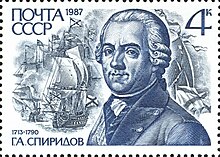Grigory Spiridov
This article needs additional citations for verification. (December 2009) |
Grigory Spiridov | |
|---|---|
| Григорий Спиридов | |
 Portrait by an unknown artist | |
| Born | Grigory Andreyevich Spiridov 1713 |
| Died | April 19, 1790 (aged 76–77) |
| Burial place | Family crypt in the village of Nagorye [ru], Pereyaslavsky Uyezd, Vladimir Governorate |
| Nationality | Russian |
| Citizenship | |
| Occupation | |
| Years active | 1723–1774 |
| Era | Modern period |
| Known for | Battle of Chesma |
| Honours | Order of Saint Andrew Order of Saint George |
Grigory Andreyevich Spiridov (Russian: Григорий Андреевич Спиридов) (1713, Vyborg – 19 April [O.S. 8 April] 1790, Moscow) was a leading Russian naval commander and admiral (1769). One of the greatest naval commanders in Russian history.[1]
Life
[edit]Early naval career
[edit]Grigory Spiridov began his career in the Russian Navy in 1723. He was promoted to an officer rank in 1733. Spiridov had been commanding different ships of the Baltic Fleet since 1741. During the Seven Years' War of 1756–1763, he was in charge of a landing party of two thousand men when Peter Rumyantsev was laying siege to the fortress of Kolberg in Pomerania. In 1762, Spiridov was promoted to the rank of rear admiral and assigned to command a squadron for securing the contact with the Russian army in Prussia. In 1764, he was appointed commander of the port of Reval and then Kronstadt (1766).
Russo-Turkish War (1768–1774)
[edit]During the Russo-Turkish War of 1768–1774, Spiridov was in charge of a squadron, which would be sent from the Baltic Sea to the Mediterranean to assist the Greeks in their struggle against the Turks in the summer of 1769 (see Orlov Revolt and First Archipelago Expedition). In early 1770, he commanded the seizure of Mistra, Arcadia, and Navarino with the help of a landing party.
On 5 July [O.S. 24 June] 1770, a Russian squadron under the nominal command of Count Alexey Grigoryevich Orlov with Spidirov in charge of the van attacked the Turkish fleet in the Chios Strait and forced it to hide in the Chesma Bay. On the night of 26 June (7 July), the Russian squadron under the actual command of Spiridov and Samuel Greig destroyed the Turkish fleet during the Battle of Chesma and established temporary supremacy in the Aegean Sea.[2] Soon thereafter, he participated in the failed siege of Lemnos.
Spiridov was awarded the Order of St. Andrew the First-Called, and Greig was awarded the Order of St. George. In 1771–1773, Spiridov commanded the Russian fleet in this region. When he resigned from the Russian Navy in 1774, many attributed it to his resentment that all the credit for his victories went to Orlov.

References
[edit]- ^ "Сто великих полководцев – История.РФ" [A hundred great military commanders]. 100.histrf.ru. Russian Military Historical Society. Archived from the original on 2023-03-25.
- ^ "Catherine's Liberation of the Greeks: High-Minded Discourse and Everyday Realities". Higher School of Economics – via Academia.edu.
- "Статьи — История Выборга — Люди, повлиявшие на историю Выборга — СПИРИДОВ Григорий Андреевич (1713-8.04.1790)". www.vbrg.ru. Archived from the original on 2017-02-11. Retrieved 9 February 2017.
